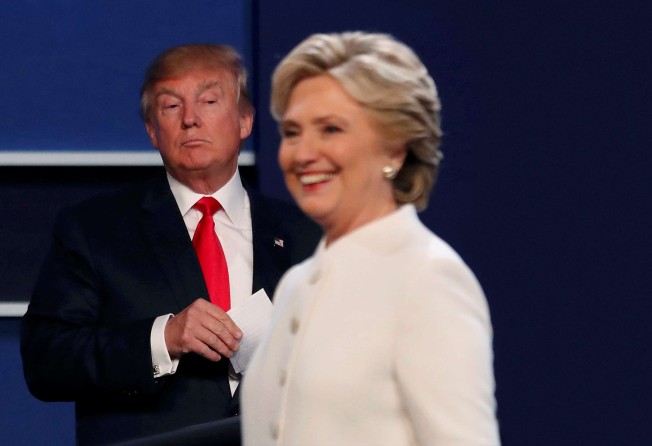
Why it’s too early to rule out Donald Trump
Despite widespread expectation of a landslide Clinton victory, the reality television star could still prove successful, and Asia is right to be worried

Consensus wisdom holds that it is all over bar the shouting. In little more than a week Americans will go to the polls to elect their next president and the vast majority of political pundits, statisticians and market traders believe the result is a foregone conclusion. Donald Trump has blown himself up and Hillary Clinton will romp home to an easy victory, with betting markets and statistical analysts alike currently putting the probability of a Clinton win at 80 to 85 per cent. In response, most US economists are heaving heartfelt sighs of relief that the chance of a Trump presidency and the economic damage they believe it would wreak has successfully been avoided.
The relief may be premature. Experience shows there is a chance that the consensus may be overly complacent and that the probability of a Trump victory may be greater than the conventional view suggests. The good news here is that a Trump presidency may not prove to be as economically destructive as most observers think – at least for the US. Across the Pacific however, a surprise victory for Trump would leave Asian countries facing a period of uncertainty, which would surely prove economically challenging.

There are several reasons to think the coming election may not be the walkover many professional observers believe. First, although prediction markets put the probability of a Clinton win at 80 per cent or more, recent opinion polls indicate a much smaller margin of victory. The clutch of polls published last Wednesday typically gave Clinton a more modest four percentage point lead, with at least one national poll signalling a slim lead for Trump and several others giving the reality television star the lead in key swing states, including Ohio and Florida.
Many in Asia have good reason to hope for a victory for Clinton as the status quo candidate, and that the prospect of a surprise Trump win outlined here proves nothing more than an unpleasant scare story.
On top of that, flawed assumptions about voter behaviour in polls that have no obvious recent precedent – either because they are one-off referendums or because one candidate comes from outside the political mainstream – mean polling companies could be underestimating the depth of anti-establishment feeling. The most obvious recent example was in June when pollsters utterly failed to foresee Britain’s Brexit vote.

More relevant, however, may be the 1980 US presidential election, which had more than a few passing similarities to the upcoming vote. In the run-up to polling day, Republican candidate Ronald Reagan, who pledged in his campaign to “make America great again”, was dismissed as sexually immoral, a racist, a bigot, the man who would start World War III and nothing but a lightweight television star – and that was just from his own side. With just a week to go and Reagan trailing in the polls, most commentators confidently predicted a landslide victory for incumbent president Jimmy Carter. In the event, Reagan won the popular vote with a margin of nearly ten percentage points and is now regarded as one of the most successful presidents of the 20th century.

Of course, history may not repeat itself, but it might yet rhyme. With the US employment ratio back down to levels not seen since the early 1980s, real incomes for many families stagnant for the past two decades and 70 per cent of Americans professing to be dissatisfied with the state of their country, popular desire to kick out against the establishment should not be underestimated. Trump may well be a deeply flawed character, but as a candidate, he is promising to deliver precisely such a kicking – a promise that could yet prove attractive to large cohorts of the electorate who have previously been disinclined to vote for anyone.
So what if Trump does actually win a week on Tuesday? The prevailing view is that if enacted, his programme would lead to economic disaster. His protectionist trade policies and his pledge to halt and even reverse immigration would throw sand in the wheels of globalisation that have driven US economic growth. The result would be recession, rising unemployment and falling real incomes, even as his promise to cut taxes and boost government spending pushes up the federal deficit by US$1 trillion a year, undermining confidence in the US dollar and precipitating a flight of foreign investors.

Conversely, it is possible to envisage a scenario in which his tax cuts and spending increases prove stimulative, while his restrictions on the immigration of unskilled workers encourage US businesses to increase investment in technologies that boost productivity and lead to an increase in real incomes. At the same time, greater overseas uncertainty caused by Trump’s more isolationist foreign policy could cause a flight to safety in the US which, coupled with greater capital repatriation in response to his favourable tax stance, would push up, rather than undermine, the US dollar.

In short, the impact of a Trump presidency on the US economy remains uncertain. In Asia, however, Trump’s promised imposition of a 45 per cent punitive tariff on US imports from China would play havoc with regional supply chains, while the shift in the balance of power resulting from diminished US involvement in the region would heighten potential instability and reduce investment. As a result, many in Asia have good reason to hope for a victory for Clinton as the status quo candidate, and that the prospect of a surprise Trump win outlined here proves nothing more than an unpleasant scare story.
Tom Holland is a former SCMP staffer who has been writing about Asian affairs for more than 20 years